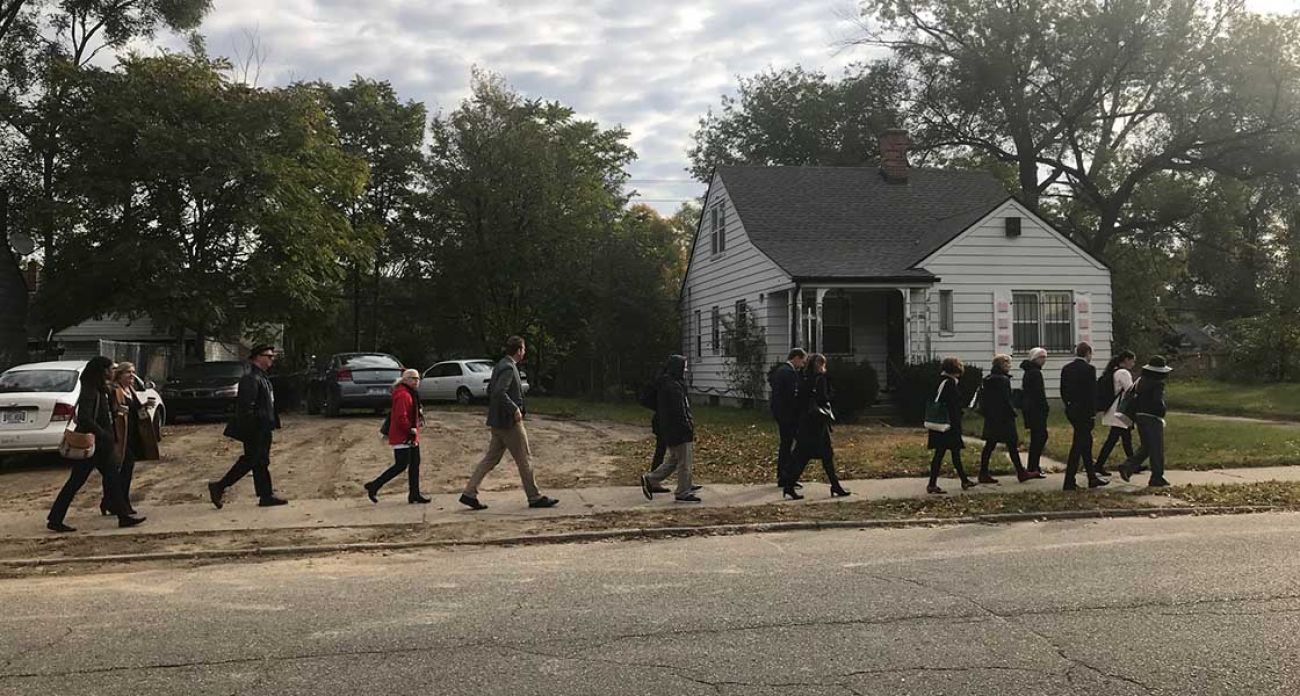Detroit is doing better. How much? That’s where experts disagree.

It wasn’t billed as a debate, but the discussion Tuesday at Detroit’s Economic Club meeting stumbled into one about whether the city’s comeback benefits all.
The event entitled, “The Divided City: Poverty and Prosperity in Urban America,” after the book of the same name, treated the lunch crowd to a view of what the city’s comeback looks like from an outsider’s view and from the officials charged with turning a blighted town into a boom town.
On the one side, the book’s author, Alan Mallach a senior fellow with the Center for Community Progress in Washington D.C. who studied Detroit extensively. On the other: Maurice Cox, the City of Detroit’s director of planning and development and an unabashed booster.
Read interviews with Cox and Mallach:
Q&A: Meet the man reimagining Detroit, one vacant lot at a time
Poverty is Detroit’s biggest problem. Gentrification doesn’t come close.
Related stories about Detroit:
- Detroit wants to extend comeback to neighborhoods. So far, it’s a slow go.
- Is Detroit coming back? It depends on the neighborhood
- Detroit wants to extend comeback to neighborhoods. So far, it’s a slow go.
- Is Detroit finally turning the corner? Or is gentrification a problem
- Is your Detroit neighborhood primed for a rebound? (interactive map)
- Can Detroit find salvation through demolition?
- Banks are lending again in Detroit … if you live in the right neighborhood
Mallach called Detroit “fascinating” for its resilience, but doused Cox’s optimism, saying the city’s comeback is not as good as Detroiters would like to think it is. Cox countered that 10 neighborhoods selected by City Hall for extra money for revitalization are proof the city its comeback to extend to beyond downtown and Midtown.

Mallach warned the city “has a long, long way to go” compared other cities due to the woeful joblessness, struggling schools and flight of the black middle class.
“After the city’s decline was so severe, I think it’s not unreasonable to see small gains as important, and I think they are important but I think you’ve got to realize they’re small gains,” Mallach told to Bridge after the event at the Masonic Temple near downtown.
“A lot of the neighborhood strategies Maurice is talking about, they’re plans, wonderful plans, but that’s what they are.
“I think there are alot of questions about how are they going to succeed, how far is it going to go, how long is it going to take.”
Cox was more optimistic.

“The rest of the country is looking to Detroit for how to be innovative in revitalizing neighborhoods,” he said. “I get an enormous amount of encouragement from residents who stuck it out. They know when you’re pulling their leg and when you’re talking real change.”
And no discussion about Detroit’s future is complete without talk of gentrification and the notion that Detroit has become two cities - the poor Detroit comprised of long-time residents and the gentrified, upper-income Detroit encompassing 7.2 miles around downtown and Midtown.
Gentrification has become a well-worn topic over the past several years since the city has seen billions of dollars in development in downtown and Midtown.
The lunchtime crowd watching the genteel debate at Masonic Temple gave its most hearty applause when Mallach said gentrification, which means different things to different people, is not inherently bad for Detroit.
“For Detroit to even begin to think it should discourage people from moving in because of fears they will somehow gentrify or push people out I think is a very counterproductive notion,” he said. “Detroit once had 2 million people … there’s room for lots of people.”
Mayor Mike Duggan’s State of the City speech in coming weeks is expected to focus not on the touchy issue of gentrification in the so-called “7.2,” but on residents who are helping to plan projects in several communities selected for revitalization, Cox said.
The speech takes place March 5.
The discussion was moderated by Bankole Thompson, a Detroit News columnist and radio host.
See what new members are saying about why they donated to Bridge Michigan:
- “In order for this information to be accurate and unbiased it must be underwritten by its readers, not by special interests.” - Larry S.
- “Not many other media sources report on the topics Bridge does.” - Susan B.
- “Your journalism is outstanding and rare these days.” - Mark S.
If you want to ensure the future of nonpartisan, nonprofit Michigan journalism, please become a member today. You, too, will be asked why you donated and maybe we'll feature your quote next time!

